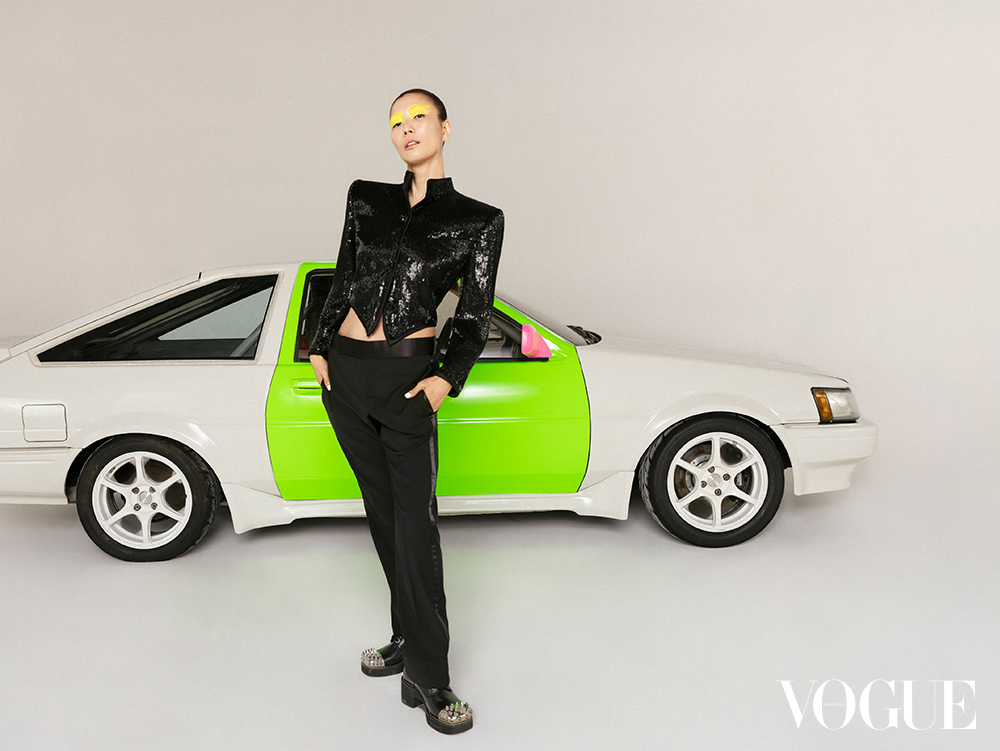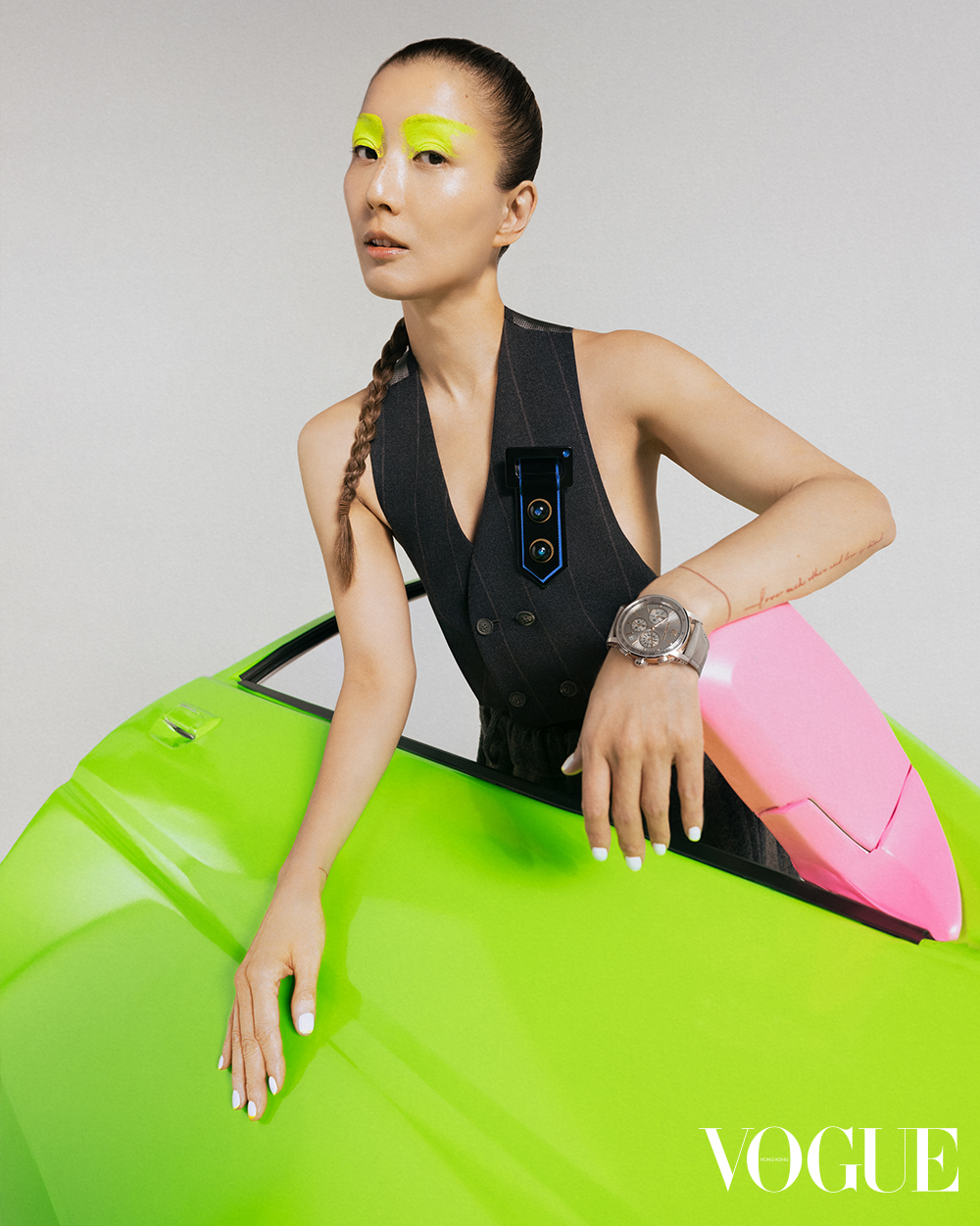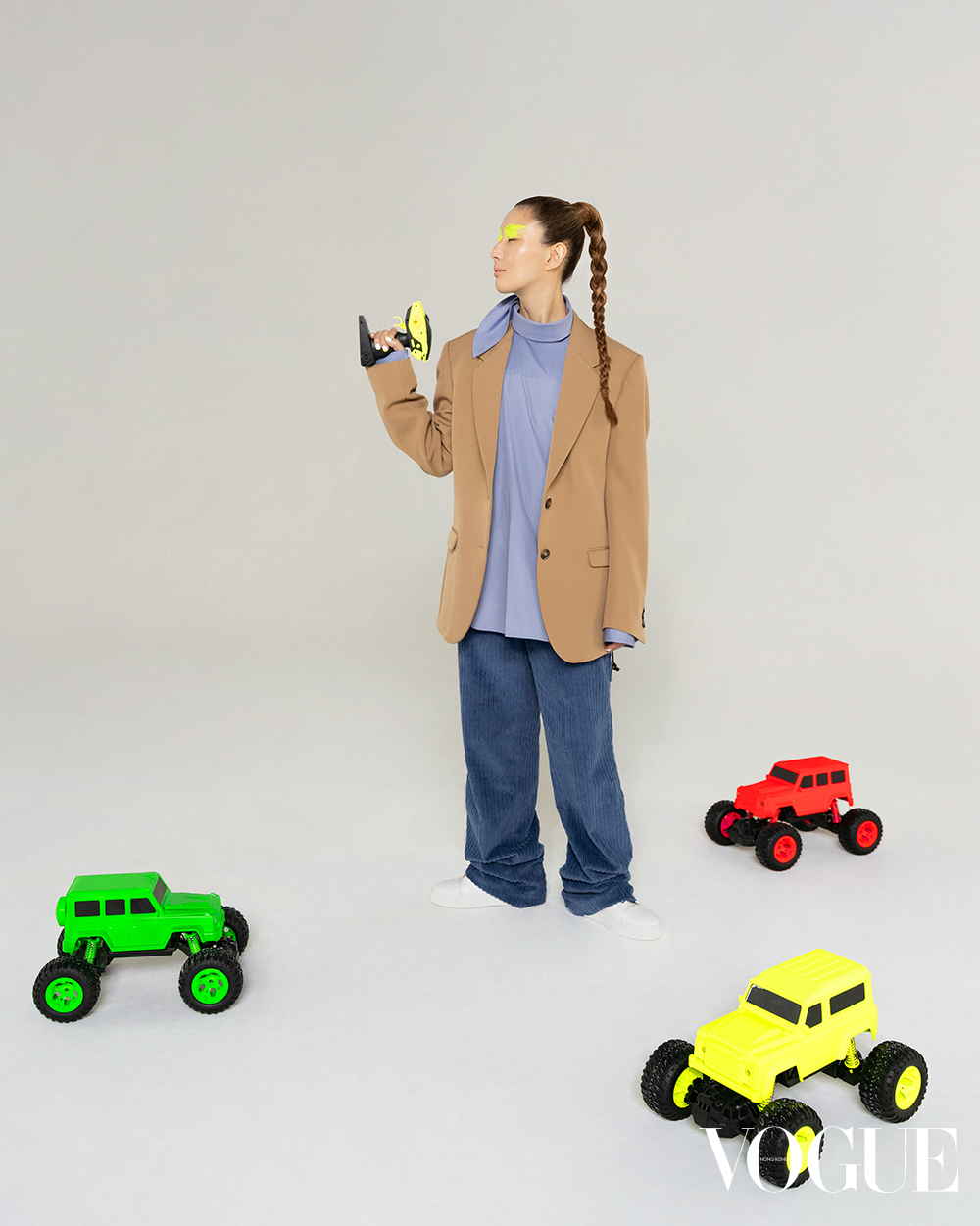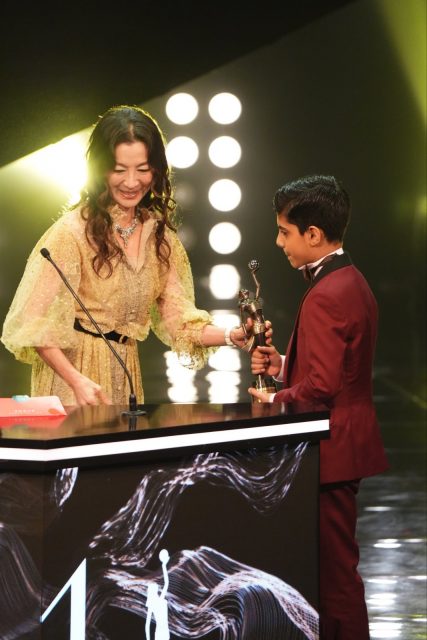Sammi Cheng is at the top of her game. For the September 2020 issue, director Stanley Kwan, who has worked with Cheng on Everlasting Regret and First Night Nerves, interviews the Canto-pop icon and actress on behalf of Vogue Hong Kong on her acting experiences and thoughts on hope.
Stepping into Clearwater Bay’s studio, we find Cheng full of energy even after a hectic day of filming for her new music video. As she prepares for her evening shoot in her dressing room, Kwan engages her in trivial small talk before guiding the conversation into a heartfelt dialogue for Vogue Hong Kong.
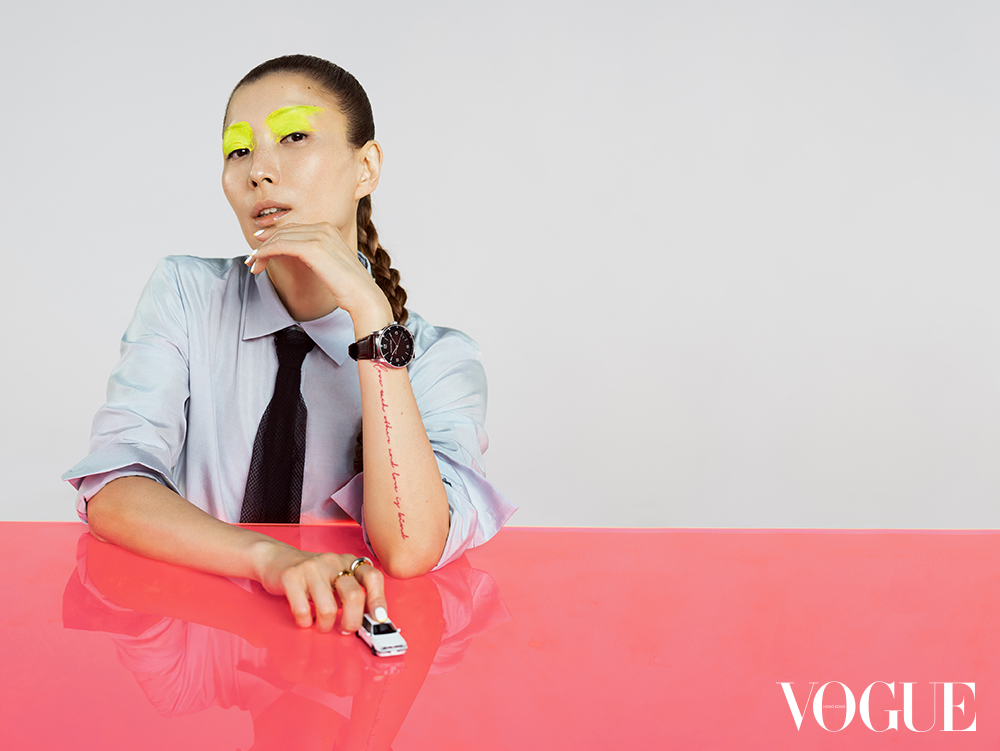
Shirt, tie and gold rings, all Dior. Silver ring, Saskia Diez from Net-a-Porter. Watch, Audemars Piguet.
Kwan: Let’s start with hope. We all have hopes for something — I myself hope for my parents’ wellbeing, as we take care to ensure they lead comfortable lives. What are your own hopes for your parents?
Cheng: There’s a lot of variability about the future. It is precisely because of this uncertainty that we need hope–otherwise, we’d all fall into despair. Not only does hope bring about positivity, but they also help us face the many uncertainties in life. As children, we should try to accommodate our parents to the best of our abilities before it’s too late. We strive to provide the best we can to our parents and shower them with unconditional love.
I don’t actually hold hope nor despair when I think about the time they have left–death is an inevitable part of life, and we should go with the flow. My father is diabetic, and though I wish he’ll cut back on certain foods, will he actually go through with it? Will a strict diet be too hard on him? I try my best, but I cannot push my hopes on him–we need to maintain a certain degree of compromise.
Kwan: The pandemic was the first time we’ve ever felt so helpless. Though at the time, I often hoped that it would end soon, when I think back to this sense of hope, I can’t help but feel down. What are your thoughts on this?
Cheng: I think remaining hopeful about the pandemic is good because it’s positive. But that involves looking at the grand scheme of things–it’s more important to live well in the moment. Even if the pandemic wouldn’t end, it’s vital to consider the type of attitudes we should approach such difficult times with. The fact that I don’t have to live in hope for the future is a sense of hope in and of itself. To have the ability to take on challenges as they come is much more satisfying to me. I’m hoping that things will look up soon is all well and good, but I try to focus more on other aspects of my life.
Blazer and pants, all Giorgio Armani. Shoes, Christian Louboutin.
Kwan: I don’t remember if I’ve mentioned it, but while filming Everlasting Regret, you were having a hard time. As the director, I observed that you were hastily hoping to improve to the point of being a perfectionist. Then you starred in First Night Nerves, and it’s as if you transformed into an entirely new person–do you think you were striving for perfection in Everlasting Regret?
Cheng: A part of me definitely did. This pursuit of perfection partly stemmed from my lack of confidence in my abilities, as I felt I had to prove myself. But once I took on First Night Nerves, I relieved myself of that burden; I no longer believed that acting is something you should do to prove your self-worth. Once you accumulate enough experience and shift your mindset, you become more confident about your performance, and it shows. I can tell there are huge differences in my acting skills in Everlast Regrets and First Night Nerves. During the latter, I performed my character with ease because I had confidence in my skills; but for the former, you could say that I had hoped that I could perform well, but deep down, I believed that I was falling short. This was on top of my malady at the time. I must say that depression certainly makes acting much more difficult. Before pinning down my character, I couldn’t control my negative emotions. It took a toll on me, but looking back, the fact that I completed the film under these circumstances was the best I could’ve done.
Kwan: As the director, I think we didn’t have a close relationship while filming Everlasting Regret. I was quite anxious, as I thought we couldn’t connect well.
Cheng: I actually thought I couldn’t deal with all of it, as I was trying to manage my depression–it was an arduous process. It didn’t help that we had to stop shooting for two weeks. I tried to communicate with others, but I had anxiety that stemmed from depression, and I had to put on an air of nonchalance every time I arrived on set despite those anxieties. Indeed, I didn’t have it in me to reach out for deeper connections with others.
Kwan: And during First Night Nerves?
Cheng: First Night Nerves opened my eyes again to the world, and it was an entirely different experience compared to Everlasting Regret. It was like I had a chance to get to know you again, and vice versa. That was the first time I truly witnessed your prowess as a director, and I thoroughly enjoyed our conversations. I admire your attention to detail and how you built intricate relationships with everyone on set.
Kwan: Our relationship isn’t the kind where we often have to meet up — I suppose our connection shows the trust you have in me.
I also want to talk about the idea of female characters. As a boy, I often watched Nan Hong’s and Patsy Ling’s movies with my mother, but it was my mother who helped me understand womanhood. My father passed away when I was fourteen. I was the eldest out of five siblings, and my mother brought us up by herself. Perhaps she didn’t want us to feel like a liability, so she never remarried, and that tenacity really stuck with me. As a gay man, this had a huge impact on me. Some say that a mother-daughter relationship is complex, consisting of both love and hate — what influences does your mother have on you?
Cheng: The way my mother raised us had some influence on me, not overwhelmingly so, as I ultimately chose a different path in life. She was happy as a wife and mother, but her way of living didn’t suit me at all. However, the sacrifices she made for her family and her children will always resonate with me, as I see them as her unconditional love for us.
There are a lot of ways of living that I may not agree with–would following in her footsteps make me happy? I’ve encountered many types of female figures, but there was never one I thought could become my role model. I felt I needed to pave my own path, to be a source of inspiration for someone else, but I never thought of imitating others. I have to admit, though, I’m more assured whenever Mum supports my decisions. This is my mother’s biggest influence on me, a feeling other female figures could never replicate.
Kwan: Just now, when you were on break, you mentioned your love of reading. Did you ever find any female characters that inspired your acting in literature? Do you prefer books with female protagonists?
Cheng: I don’t have this preference, but I try to read novels from different countries. Different localities have their own characteristics and writing styles. These stories help me better understand my characters as I develop a deeper awareness of human nature.
Kwan: Many think my films feature strong-willed women like Ruan Lingyu and Fleur, who both committed suicide, while my male characters tend to be more indecisive. Do you also often find yourself in a more dominant position in a relationship?
Cheng: A loving relationship isn’t faceted. It’s impossible to be perpetually strong or weak, as this would hurt a significant other. If the other person becomes weaker, I take up a stronger role in the relationship for a while, and vice versa. This balance is the secret to a long-lasting relationship.
Kwan: When it comes to romance, there tends to be a period of passion before the relationship cools down, before potentially evolving into that of a family. What do you think of this?
Cheng: I wholly agree with you. To me, the process of evolving from a passionate relationship into one of domesticity is wonderful. Some may think a relationship without excitement would become boring, but I’m more traditional. A relationship that could transform into a familial one is hard to come by. Think about it: how many people in your life will become your family and share your burdens? This is something that I’ve dreamed of having.
View this post on Instagram
Kwan: We’ve both matured over the years. I’ve since experienced a sense of letting go of my insecurities. What do you think of this process?
Cheng: There’s no definite relationship between self-confidence and shrugging off your insecurities. Some people may be very confident yet still hold onto their self-doubts. This is something everyone would experience at some point in their lives.
Kwan: Your single We Grew This Way is about finding your self-confidence. At what point in your acting career did this happen?
Cheng: Different life stages can draw out different types of confidence. When you’re young, your confidence is less solid as you continue holding on to your shortcomings. It is only after you’ve matured that you become self-assured, as different experiences bring about wisdom and the ability to develop your self-confidence.
Kwan: I developed my self-confidence when I became deputy director at TVB. I was very fortunate to have directors Ann Hui and Patrick Tam by my side, and through them, I discovered my strengths and weaknesses. I remember when we were filming First Night Nerves in Sai Wan, you mentioned that you used to live in Shek Tong Tsui and would watch me and Anita Mui shoot Rouge from your home. Was there an actress or musician you saw yourself in who helped you find your confidence?
Cheng: We often hope to find ourselves in other people, but I discovered that my greatest source of inspiration stems from religious belief. Much of the wisdom you seek in life may not lie in those around you but rather in a copy of the Bible.
Translation by Mina Chan
Photographer: Luke Casey
Creative Director & Stylist: Sean Kunjambu
Producer: Katherine Ho
Makeup Artist: Ricky Lau
Hair Stylist: Billy Choi @Hair Culture
Photographer Assistants: Chester Siu & Scottie Wong
Fashion Assistants: Karen Tsang & Foxla Chiu & Marco Lee
Set Assistant: Eric Chiu
Post Production: Aly Studio
Cover Wardrobe: Giorgio Armani
Cover Watch: Audemars Piguet
Editor
Vogue Hong Kong
